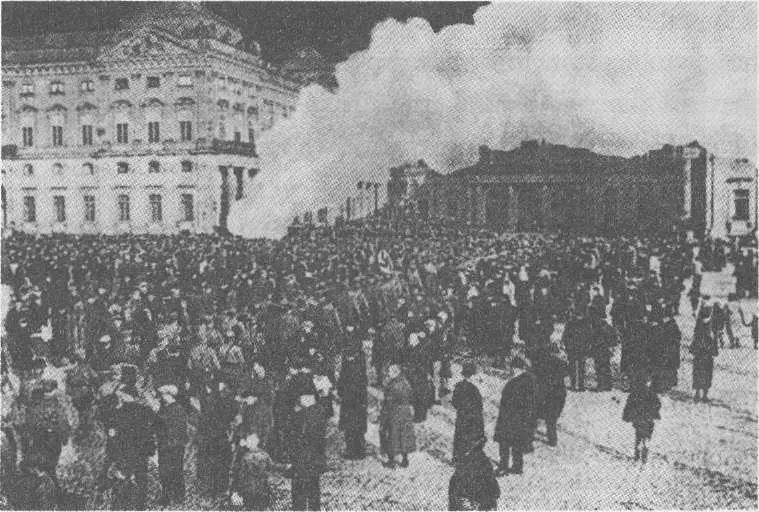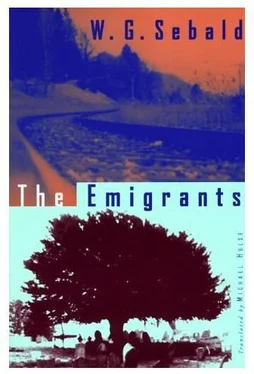Following this late reunion, which neither of us had expected, we talked for three whole days far into the night, and a great many more things were said than I shall be able to write down here: concerning our exile in England, the immigrant city of Manchester and its irreversible decline, the Wadi Haifa (which had long ceased to exist), the flugelhorn player Gracie Irlam, my year as a schoolteacher in Switzerland, and my subsequent attempt, also aborted, to settle in Munich, in a German cultural institute. Ferber commented that, purely in terms of time, I was now as far removed from Germany as he had been in 1966; but time, he went on, is an unreliable way of gauging these things, indeed it is nothing but a disquiet of the soul. There is neither a past nor a future. At least, not for me. The fragmentary scenes that haunt my memories are obsessive in character. When I think of Germany, it feels as if there were some kind of insanity lodged in my head. Probably the reason why I have never been to Germany again is that I am afraid to find that this insanity really exists. To me, you see, Germany is a country frozen in the past, destroyed, a curiously extraterritorial place, inhabited by people whose faces are both lovely and dreadful. All of them are dressed in the style of the Thirties, or even earlier fashions, and wearing headgear that does not go with their clothing at all — pilots' helmets, peaked caps, top hats, ear muffs, crossover headbands, and hand-knitted woollen caps. Almost every day a beautiful woman wearing a ball gown made of grey parachute silk and a broad-brimmed hat trimmed with grey roses visits me. Hardly have I sat down in my armchair, tired from work, but I hear her steps outside on the pavement. She sweeps in at the gate, past the almond tree, and there she is, on the threshold of my workshop. Hastily she comes over to me, like a doctor afraid that she may be too late to save a sinking patient. She takes off her hat and her hair tumbles about her shoulders, she strips off her fencing gloves and tosses them onto this little table, and she bends down towards me. I close my eyes in a swoon — and how it goes on after that point, I do not know. One thing is certain: we never say a word. The scene is always a silent one. I think the grey lady understands only her mother tongue, German, which I have not once spoken since I parted from my parents at Oberwiesenfeld airport in Munich in 1939, and which survives in me as no more than an echo, a muted and incomprehensible murmur. It may possibly have something to do with this loss of language, this oblivion, Ferber went on, that my memories reach no further back than my ninth or eighth year, and that I recall little of the Munich years after 1933 other than processions, marches and parades. There seems always to have been a reason for them: May Day or Corpus Christi, carnival or the tenth anniversary of the Putsch, Reichsbauerntag or the inauguration of the Haus der Kunst. They were forever bearing either the Sacred Heart through the city centre or what they called the Blutfahne , the banner of blood. On one occasion, said Ferber, they put up trapezi-form pedestals draped in chestnut-coloured cloth on either side of the Ludwigstrasse, all the way from the Feldherrnhalle into the heart of Schwabing, and on every one of the pedestals a flame was burning in a shallow iron bowl. At these constant assemblies and parades, the number of different uniforms and insignia noticeably increased. It was as if a new species of humanity, one after another, was evolving before our very eyes. I was filled with wonderment, anger, yearning and revulsion in equal measure; as a child, and then as a teenager, I would stand silently amidst the cheering or awe-struck crowds, ashamed that I did not belong. At home, my parents never talked about the new order in my presence, or only did so obliquely. We all tried desperately to maintain an appearance of normality, even after Father had to hand over the management of his gallery across from the Haus der Kunst, which had opened only the year before, to an Aryan partner. I still did my homework under Mother's supervision; we still went to Schliersee for the skiing in winter, and to Oberstdorf or the Walsertal for our summer holidays; and of those things we could not speak of we simply said nothing. Thus, for instance, all my family and relatives remained largely silent about the reasons why my grandmother Lily Lanzberg took her own life; somehow they seem to have agreed that towards the end she was no longer quite in her right mind. Uncle Leo, Mother's twin brother, with whom we drove from Bad Kissingen to Wiirzburg after the funeral, at the end of July 1936, was the only one I occasionally heard talk outspokenly about the situation; but this was generally met with disapproval. I now remember (said Ferber) that Uncle Leo, who taught Latin and Greek at a grammar school in Wiirzburg until he was dismissed, once showed Father a newspaper clipping dating from 1933, with a photograph of the book burning on the Residenzplatz in Wiirzburg. That photograph, said Uncle, was a forgery. The burning of the books took place on the evening of the 10th of May, he said — he repeated it several times — the books were burnt on the evening of the 10th of May, but since it was already dark, and they couldn't take any decent photographs, they simply took a picture of some other gathering outside the palace, Uncle claimed, and added a swathe of smoke and a dark night sky. In other words, the photographic document published in the paper was a fake. And just as that document was a fake, said Uncle, as if his discovery were the one vital proof, so too everything else has been a fake, from the very start. But Father shook his head without saying a word, either because he was appalled or because he could not assent to Uncle Leo's sweeping verdict. At first I too found the Wurzburg story, which Ferber said he was only then remembering for the first time, somewhat on the improbable side; but in the meantime I have tracked down the photograph in question in a Wurzburg archive, and as one can easily see there is indeed no doubt that Ferber's

uncle's suspicions were justified. Continuing his account of his visit to Wurzburg in summer 1936, Ferber said that one day when they were strolling in the palace gardens Uncle Leo told him that he had been compulsorily retired on the 31st of December the year before and that, in consequence, he was preparing to emigrate from Germany, and was planning to go to England or America shortly. Afterwards we were in the great hall of the palace, and I stood beside Uncle, craning up at Tiepolo's glorious ceiling fresco above the stairwell, which at that time meant nothing to me; beneath the loftiest of skies, the creatures and people of the four realms of the world are assembled on it in fantastic array. Strangely enough, said Ferber, I only thought of that afternoon in Wiirzburg with Uncle Leo a few months ago, when I was looking through a new book on Tiepolo. For a long time I couldn't tear myself away from the reproductions of the great Wiirzburg fresco, its light-skinned and dark-skinned beauties, the kneeling Moor with the sunshade and the magnificent Amazon with the feathered headdress. For a whole evening, said Ferber, I sat looking at those pictures with a magnifying glass, trying to see further and further into them. And little by little that summer day in Wiirzburg came back to me, and the return to Munich, where the general situation and the atmosphere at home were steadily becoming more unbearable, and the silence was thickening. Father, said Ferber, was something of a born comedian or play-actor. He enjoyed life, or rather, he would have enjoyed it; he would have liked to go to the Theater am Gàrtnerplatz still, to the revues and wine bars; but, because of the circumstances, the depressive traits that were also in his character overlaid his essentially cheerful nature towards the end of the Thirties. He began to display an absent-mindedness and irritability which I had not seen in him before; both he and Mother put it down to a passing nervousness, which for days at a time would dictate his behaviour. He went to the cinema more and more often, to see cowboy films and the mountaineering films of Luis Trenker. Not once was there any talk of leaving Germany, at least not in my presence, not even after the Nazis had confiscated pictures, furniture and valuables from our home, on the grounds that we had no right to the German heritage. All I remember is that my parents were particularly affronted by the uncouth manner in which the lower ranks stuffed their pockets full of cigarettes and cigarillos. After the Kristallnacht, Father was interned in Dachau. Six weeks later he came home, distinctly thinner and with his hair cropped
Читать дальше













